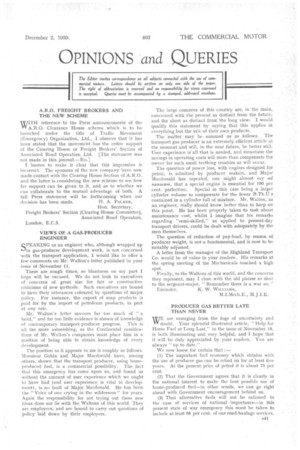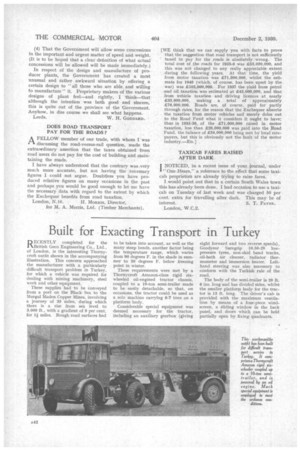OPINIONS and QUERIES
Page 43

Page 44

If you've noticed an error in this article please click here to report it so we can fix it.
A.R.O. FREIGHT BROKERS AND THE NEW SCHEME WITH reference to the Press announcements of the " A.R.O. Clearance House scheme which is to be launched under the title of Traffic Movement (Emergency) Organization, Ltd., I observe that it, has been stated that the movement has the entire support of the Clearing House or Freight Brokers' Section of Associated Road Operators, Ltd. [The statement was not made in this journal.—En.] I hasten to make it clear that this impression is incorrect. The sponsors of the new company have now made contact with the Clearing House Section of A.R.O. and the latter is considering the new scheme to see how far support can be given to it, arid as to whether we can collaborate to the mutual advantage of both. A full Press statement will be forthcoming when our decision has been made. H. A. PALMER, Hon. Secretary, Freight Brokers' Section (Clearing House Committee), Associated Road Operators.
Londoh, E.C.S.
VIEWS OF A GAS-PRODUCER ENGINEER
QPEAKING as an engineer who, although wrapped up 0.-)in gas-producer development work, is not concerned with the transport application, I would like to offer a few comments on Mr. Walton's letter published in your issue of November 11.
These are rough times, so bluntness on my part I hope will be excused. We do not look to executives of concerns of great size for fair or constructive criticisms of new rpethods. Such executives are bound to have their utterances coloured by questions of major policy. For instance, the export of soap products is paid for by the import of petroleum products, in part at any rate.
Mr. Walton's letter savours far too much of "a brief," and far too little evidence is shown of knowledge of contemporary transport-producer progress. This is all the more astonishing, as the Continental ramifications of Mr. Walton's companies must place him in a position of being able to obtain knowledge of every development.
The position as it appears to me is roughly as follows. Monsieur Gohin and Major Macdonald have, among others, shown that the transport producer, using homeproduced fuel, is a commercial possibility. The fact that this emergency has come upon us, and found us without the amount of user experience which we ought to have had (and user experience is vital to development), is no fault of Major Macdonald. He has been the "Voice of one crying in the wilderness" for years. Again the responsibility for not trying out these new ideas does not lie with the Waltons of this world. They are employees, and are bound to carry out questions of policy laid down by -their employers.
The large concerns of this country are, in-the main, concerned with the present as distinct from the future, and the short as distinct from-the long view. I would qualify this statement by saying that this applies in everything but the sale of their own products.
The matter may be summed us as follows. The transport gas producer is an extremely efficient article at the moment and will, in the near future; be better still. User experience is'all that is needed, and meantime the savings in operating costs will more than compensate -the owner for such small teething troubles as will occur.
The question of power loss, with engines designed for petrol, is admitted by producer makers, and Major Macdonald has repeated, one might almost say ad nauseam, that a special engine 'is essential for 100 per cent.perfection. Special in. this case being a larger cylinder volume to compensate for -the fewer B.Th.U.s contained in a cylinder full of mixture.. Mr. Walton, as aa engineer, really should know better than to harp on this point. He has been properly taken 'to task about maintenance cost, whilst I imagine that his remarks regarding "semi-skilled," as applied to present-day transport drivers, could be dealt with adequately by the men themselves.
The question of reduction of pay-load, by reason of producer weight, is not a fundamental, and is now to be suitably adjusted.
A letter from the manager of the Highland Transport Co. would be of value to your readers. His remarks at the spring meeting of the Mechanicals touched a high spot.
Finally, to the Waltons of this world, and the concerns they represent, may I close with the old phrase so dear to the sergeant-major, "Remember there is a war on."
Ilminster. K. W. WILLIAMS, M.I.Mech.E., M.J.I.E.
PRODUCER GAS BETTER LATE THAN NEVER
WE are emerging from the fogs of uncertainty and doubt. Your splendid illustrated article, " Help for Home Fuel at Long Last," in the issue of November 18, is both illuminating and very helpful, and I hope that it will be duly appreciated by your readers. You are always "up to date."
We now know for certain that :—
(1) The important fuel economy which obtains with the use of producer gas can be relied on for at least five years. At the present price of petrol it is about 75 per cent.
(2) That the Government agrees that it is clearly in the national interest to make the best possible use of home-produced fuel—in other words, we can go right ahead with Government encouragement behind us.
(3) That alternative fuels will not be rationed in the case of services of national importance—in this present state of war emergency this must be taken to include at least 95 per cent. of our road-haulage services. (4) That the Government will allow some concessions in the important and urgent matter of speed and weight. (It is to be hoped that a clear definition of what actual concessions will be allowed will be made immediately.) In respect of the design and manufacture of producer plants, the Government has created a most unusual and rather awkward situation by offering a certain design to " all those who are able and willing to manufacture" it. Proprietary makers of the various designs of plant feel—and rightly, I think—that although the intention was both good and sincere, this is quite out of the province of the 'Government. Anyhow, in due course we shall see what happens.
Leeds. W. H. GODDARD.
DOES ROAD TRANSPORT PAY FOR THE ROADS?
AFELLOW member of our trade, with whom I was discussing the road-versus-rail question, made the extraordinary assertion that the taxes obtained from road users do not pay for the cost of building and maintaming the roads.
I have always understood that the contrary was.very much more accurate, but not having the necessary
figures could not argue. Doubtless you have produced relative figures on many occasions in the past and perhaps you would be good enough to let me have the necessary data with regard to the extent by which the Exchequer benefits from road taxation.
London, N .1 6. H. MORRIS, Director, for M. A. Morris, Ltd. (Timber Merchants).
[WE think that we can supply you with facts to prove that the suggestion that road transport is not sufficiently taxed to pay for the roads is absolutely wrong. The total cost of the roads for 1935-6 was £55,000,000, and this was not changed to any really appreciable extent during the following years. At that time, the yield from motor taxation was £71,000,000, whilst the estimate for 1940 (which, of course, has been upset by the war) was £105,000,000. For 1937 the yield from petrol and oil taxation was estimated at £43,000,000, and that from vehicle taxation and driving licences at nearly £33,000,000, making a total of approximately £76,000,000. Roads are, of course, paid for partly through rates, for the reason that the Exchequer absorbs the taxation from motor vehicles and merely doles out to the Road Fund what it considers it ought to have: thus in 1935-36, of the £71,000,000 raised in motor taxation, less than £26,000,000 was paid into the Road Fund, the balance of £34,000,000 being met by local ratepayers, but this is obviously not the fault of the motor industry.—ED.] .
TAXICAB FARES RAISED AFTER DARK I NOTICED, in a recent issue of your journal, under I "One Hears," a reference to the effect that some taxicab proprietors are already trying to raise fares.
I would point out that in a certain South Wales town this has already been done. I had occasion to use a taxicab on Tuesday of last week and was charged 50 per cent, extra for travelling after dark. This may be of interest. S. T. PAYNE, London, W.C.2.




































































